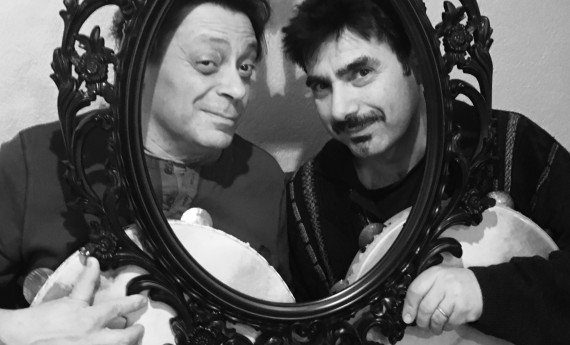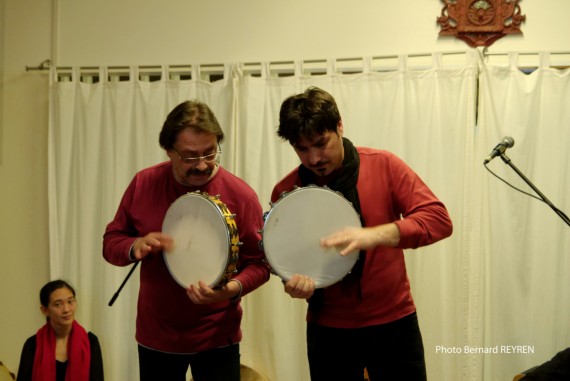adem
d'ethnomusicologie
Tammorra et tamburello - Sud de l'Italie
Salvatore Meccio et Massimo Laguardia
Europe | Percussion

Contenu et articulation du cours :
Comme pratiquement tous les instruments de percussion, la tammorra et le tamburello sont des instruments d’agrégation sociale et d’esprit collectif. Que ce soit par des cours individuels ou collectifs, l’objectif sera de se former à la pratique d’ensemble dans lesquels il vous sera possible de faire danser aux sons des tambours tels qu’ils sont joués dans le Sud de l’Italie.
Quel meilleur moyen pour commencer la pratique de ces instruments que de commencer par les construire soi-même ? Ainsi, le cours prévoit la possibilité de fabriquer son propre instrument. Pour ceux qui le souhaitent, il est aussi possible de les faire venir d’Italie. Quoi qu’il en soit, lors de la première leçon gratuite, des instruments seront mis à disposition pour découvrir cet univers si particulier des percussions d’Italie du Sud.
1) Présentation : la peau, le bois, les sonnailles (éventuellement construction de son propre instrument
2) Les différents coups de base avec les différentes parties de la main (main gauche et main droite)
3) Figures rythmiques élémentaires
4) Rythmes de la tarantella et de la tammurriata (Sicile, Pouilles, Campanie et Calabre)
5) Composition avec différentes figures rythmiques et technique expressive.
6) Accompagnement de chansons traditionnelles, mais aussi créativité personnelle
7) Utilisation de ces instruments dans d’autres genres musicaux de fusion
Bio
Salvatore Meccio est né et à grandi en Sicile, d’abord immergé dans la culture paysanne d’un petit village, puis dans celle, urbaine, de la ville de Palerme. C’est dans ces lieux qu’il a respiré l’air populaire, poétique et musical, riche autant de traditions anciennes que de nouveaux développements culturels de fusion ou de métissage ; c’est là qu’il a apprit l’art de l’écriture de chansons en dialecte et à s’accompagner de la guitare battante, des tammorre et des tamburelli, les instruments typiques du Sud de l’Italie.
Inspiré des grands maîtres siciliens tels qu’Alfio Antico et Massimo Laguardia, ou de l’italo-français Carlo Rizzo, il a développé sur la tammorra et sur le tamburello un style fondé sur les techniques siciliennes, des Pouilles, de la Campanie ou de Calabre.
Après un parcours de concertiste avec divers formations sur les places, dans les écoles et sur les planches de nombreuses scènes de festivals de musiques ethniques du monde il aboutit à Genève où il se propose de partager son savoir musical au travers de cours de technique de base, individuels ou collectifs, sur la tammorra et sur le tamburello, pour les débutants comme pour les percussionnistes chevronnés.
Massimo Laguardia est né en Sicile. Depuis sa jeunesse il s'est passionné pour la musique populaire. Il a d'abord étudié la musique sud-américaine puis s'est focalisé sur la musique populaire du sud de l'Italie. Il en est devenu l'un des meilleurs représentants aussi bien avec la voix, que la tammorra et d'autres instruments de percussions.
Après la fondation du groupe Agricantus dans les années 80, il rencontre Alfio Antico, grand maître de Tammorra, qui lui transmet la passion de cet instrument. Il développe au fil des ans une technique personnelle de haute virtuosité. Au début des années 90, il fonde le groupe Tammorra avec Salvatore Meccio et d'autres musiciens avec lesquels il entreprend une activité de concert internationale très intense.
Depuis 1999 il transmet son savoir avec une pédagogie très subtile liée à un profond charisme aux débutants comme aux professionnels dans toute l'Europe.
LIEU :
Ateliers d'ethnomusicologie - 10 rue de Montbrillant, 1201 Genève
HORAIRES :
Mardi de 18h à 22h - 2 fois par mois
Mercredi de 18h à 22h - tous les semaines
Jeudi de 9h à 11h - 1 fois par mois (nouvelles)
Samedi de 10h à 13h - 1 fois par mois
Il est conseillé de contacter le professeur pour connaître les horaires exacts des groupes (débutants - intermédiaires - avancés)
TARIFS :
Cours collectifs : 150 frs / 4 heures par mois
Cours individuel : 200 frs / 120 minutes ( 2 cours /mois )
CONTACT :
Salvatore :
T : 021 824 30 62 (après 19h) / 079 776 61 01
Email : meccioarte@gmail.com
Massimo :
T : 076 562 52 44
Email: cuoretamburo@gmail.com
